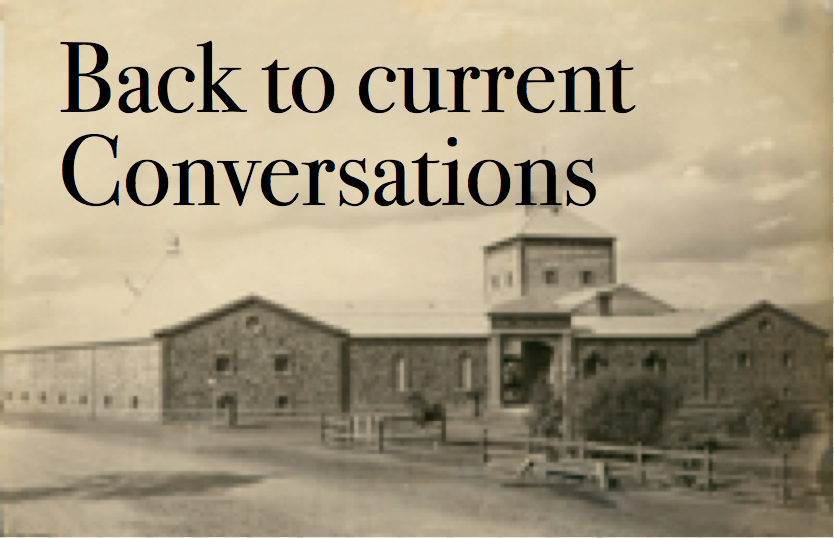

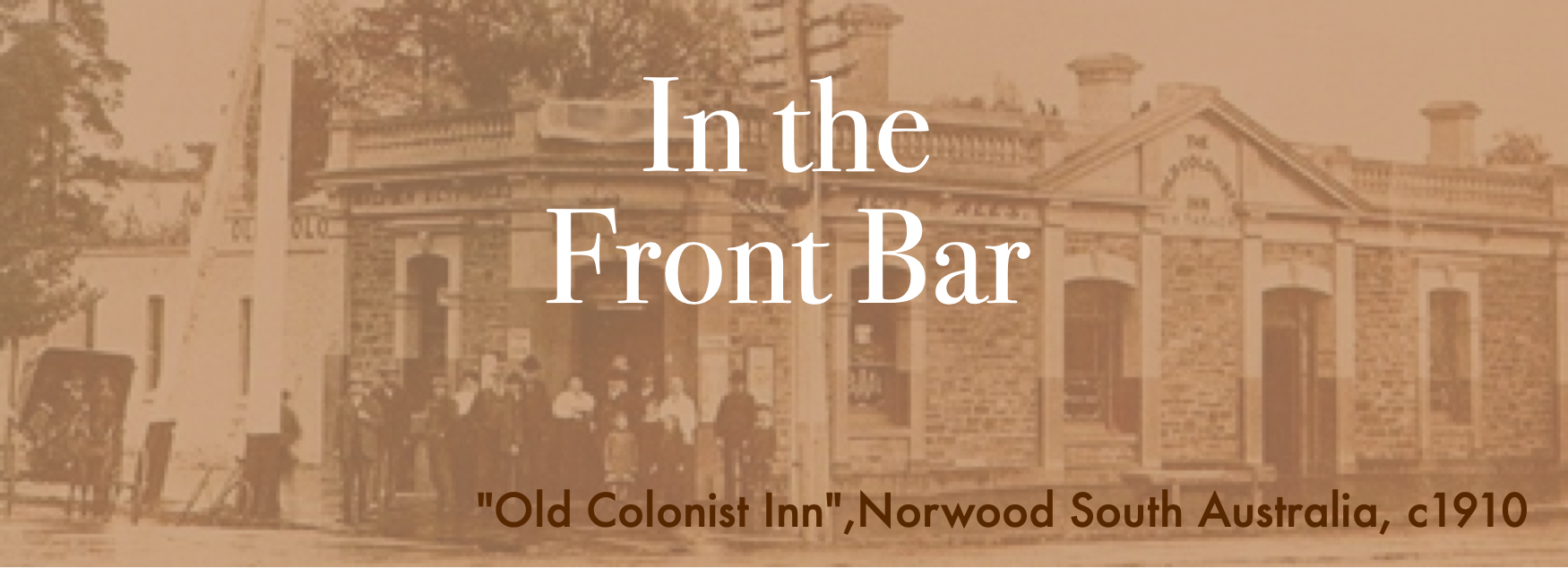
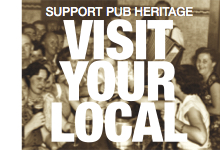
Diwottiow pedrevanas: the Moonta pub-crawl
|
Kernewek Lowender, the Cornish festival held biennially on South Australia's "Copper Coast" seems like a good enough reason to publish a self-guided walking tour of Moonta's heritage pubs. After all "Kernewek Lowender" means "Cornish happiness" and what should make you happier than catching up with friends and family at one of Moonta's pubs...or all three.
Copper was discovered at Moonta in 1861; the Government township of Moonta was proclaimed in mid-1863 and, by mid-September, two pubs had been built and licensed, the Moonta Hotel and the Prince of Wales. Moonta's other three pubs were built and licensed in 1865, just two years after the first. That Moonta's remaining pubs have survived for almost 160 years shows remarkable resilience. Yet, despite the evidently close relationship between the pubs and the Moonta community, public drunkenness was rare. Moonta was populated by "a remarkably sober people. The miners used to set apart a night for visiting the hotels; yet it never was a toper's paradise. Now even on Saturday night the public-houses are quiet, and it would be hard to meet an intoxicated man staggering down the street" [1]. |
|
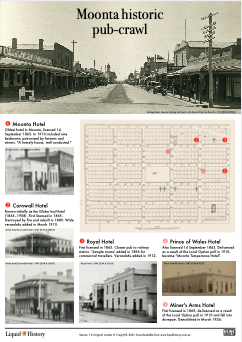
(Click image to download in new window; approx 5MB) |
As copper mining and the population of Moonta declined after the First World War, farmers, travellers and later tourists replaced miners and their families as the main patrons of the pubs. Quality accommodation and dining and amenities such as hot water, electric light and wireless - radio, not NBN - became increasingly important attractions and the Moonta pubs adapted accordingly. Remarkably also, the town has not lost a pub since 1910.
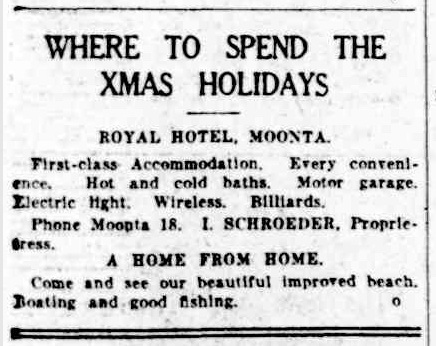
Advt for Royal Hotel, 1929 [News, 16 December 1929] |
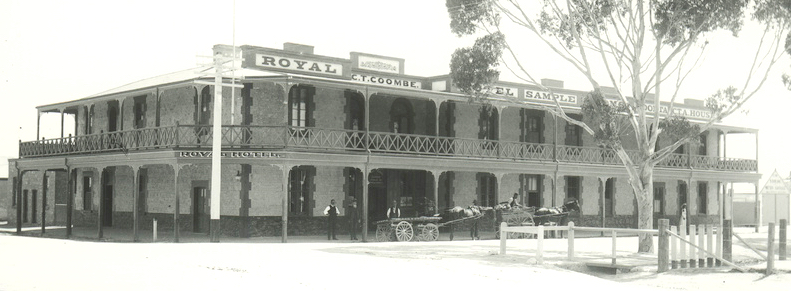
Royal Hotel, c1915 [State Library of South Australia: B-33902] |
...and a brief note on the Pier Hotel, Port Moonta
As a result of the Local Option poll of 1910 [4], the greater Moonta area also lost the Pier Hotel, the only pub at Port Moonta, about 2km west of Moonta.
|
In September 1873 John Kerrison, stone mason, farmer and publican, built the Pier Hotel, on Section 872, adjoining the original Port Moonta subdivision; interestingly Kerrison didn't actually purchase the land "and its appurtenaces", presumably including the pub, until December 1873. The hotel stood on 4½ acres (1.8 hectares), was two-storied and, according to one description, boasted a large balcony. It was first leased to and licensed by John Watherstone and over the following 38 years by 13 other publicans. Kerrison died in 1890 and in 1895 the Pier Hotel was purchased by William Knapman & Sons of the
Cannon Brewery to which it remained 'tied' until it was closed in 1910. [5]
In the evidence heard before the Special Licensing Bench in July 1910, the Pier Hotel was described as having 27 rooms of which 15 were bedrooms, 2 used by the family of the licensee and 2 others by long-term boarders; there was good stabling for 10 horses. The hotel did a "large bar trade in summer" when Port Moonta attracted "about 200 [daily], a tenth of whom visited the hotel" [6]. Although the local police testified that the pub was "well conducted", the Pier Hotel was one of the public houses that were delicensed, perhaps partly because Port Moonta was inhabited mostly by fishermen, the majority of whom were teetotallers, perhaps partly because the nearby jetty and wharf were in disrepair and by 1910 Moonta's copper was transported by rail rather than by sea but most probably because Knapman & Sons stopped brewing and rationalised its businesses at almost exactly the same time as the Bench decided which 7 of the 21 pubs in the Wallaroo district to close. The Pier Hotel technically ceased to be a public house in March 1911 and its 'furniture and effects' were sold off a month later [7]. By September 1911, the former 'Pier Hotel' became 'Pier House', a boarding house, occasionally referred to as a 'seaside resort' [8]. In September 1922 the verandah and a water tank were blown away by a severe storm [9] and in July 1924 the old Pier Hotel was all but completely destroyed by fire [10], leaving the ruins probably as shown in the photograph below. By my calculations, the Pier Hotel stood on or was close to the property that is now 17 Hughes Avenue, Moonta Bay. |
|
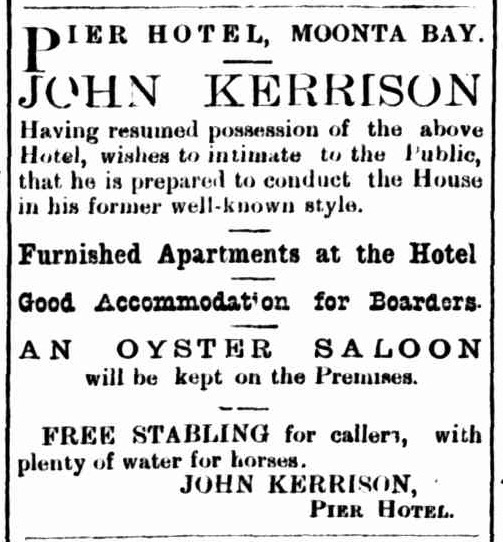
Advertisement for the Pier Hotel and John Kerrison, 1884 [Yorke's Peninsula Advertiser, 7 November 1884, p.1] 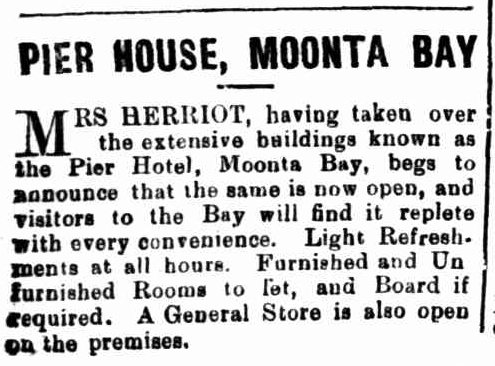
Advertisement for Mrs Herriot's 'Pier House', 1911 [Advertiser, 20 September 1911] 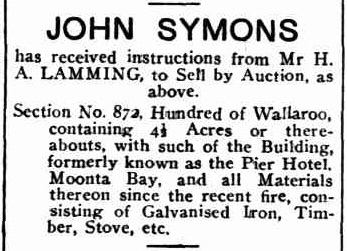
Former Pier Hotel fire sale, 1924 [Kadina & Wallaroo Times, 2 August 1924, p.4] |

Possible ruins of the Pier Hotel, Port Moonta, from the jetty looking south-east, 1936
[State Library of South Australia: B-11646; click image to enlarge]
Notes
| 1 | Adelaide Observer, 11 February 1899, p.42 |
| 2 | For examples, Advertiser, 6 January 1866, p.3; Wallaroo Times..., 8 September 1869, p.1; in the build up to the 'Back to Moonta' celebrations in 1928, Jack Jewell recalled that "skittles and wrestling were favorite pastimes of the miners at the old Moonta Hotel." News, 24 August 1927, p.5. |
| 3 |
Oswald Pryor, "Cornish Carols", News, 24 December 1925, p.6; also Mail, 18 December 1948, p.1.
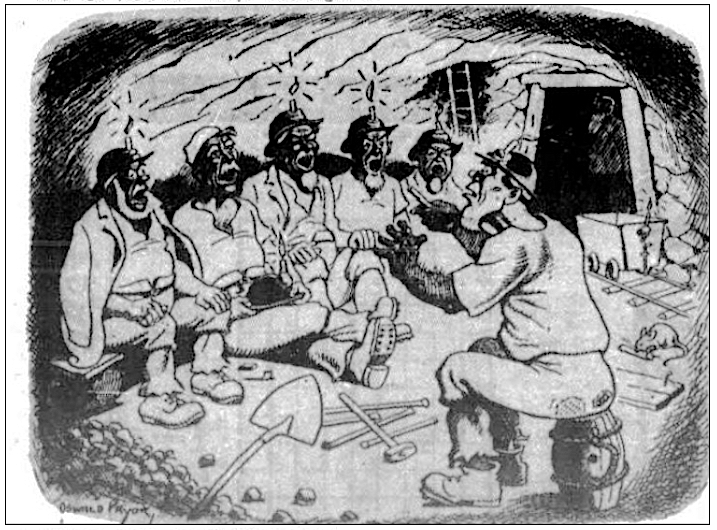 |
| 4 | A Local Option poll - a plebiscite usually to change the number of pubs - was held on 2 April 1910 in 24 of the state's Licensing Districts. Of these only the Wallaroo Licensing District, which included Moonta, voted for a 'reduction' which, in this case, meant the summary closure 7 of the area's 21 pubs. Sixty-three percent of the voters of Moonta opted for 'reduction', compared to fifty-six percent for the whole district. |
| 5 |
Land Services Group: Land Grant/Certificate of Title Vol 186 Folio 10, 16 December 1873; and CT Vol 1152 Folio 130, 13 April 1920; LTO Plan 4242. "Northern District Licensing Bench", Northern Argus, 12 September 1873 |
| 6 | Kadina and Wallaroo Times, 16 July 1910, p.2 |
| 7 | Yorke's Peninsula Advertiser, 7 April 1911, p.2 |
| 8 | Advertiser, 20 September 1911; Advertiser, 8 October 1918 |
| 9 | Recorder. 27 September 1922 |
| 10 | Kadina and Wallaroo Times, 16 July 1924; Chronicle, 19 July 1924 |
Posted 17 May 2021 Original content © Craig Hill 2021
